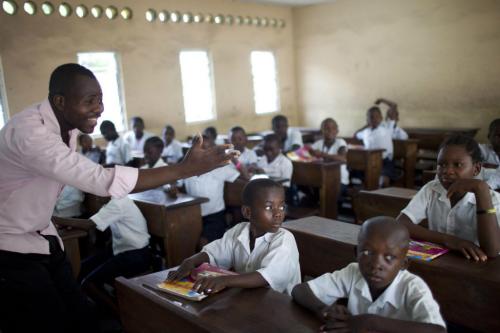Empower teachers; give them the freedom to teach, UN urges on World Day
Underscoring the critical important role teachers play in ensuring the future for every society, the United Nations called for empowering educators with the freedom and support they need to undertake their vital mission on Oct 05.

Children in their classroom as the teacher conducts the lesson at the St. Louis Primary School in Kinshasa, Democratic Republic of the Congo.
“Being an empowered teacher means having access to high-quality training, fair wages, and continuous opportunities for professional development,” the heads of key UN agencies and programmes said on Oct 05 in a joint message on World Teachers’ Day.
Empowerment also means teachers having the freedom to support the development of national curricula, the professional autonomy to choose teaching methods and approaches and being able to teach in safety and security during times of political change, instability and conflict, they added.
The joint message was issued by Irina Bokova, the Director-General of the UN Educational, Scientific and Cultural Organization (UNESCO); Guy Ryder, the Director-General of International Labour Organization (ILO); Anthony Lake, the Executive-Director of UN Children’s Fund (UNICEF); Achim Steiner, the Administrator of the UN Development Programme (UNDP); and Fred van Leeuwen, the General-Secretary of Education International (a global federation representing organizations of teachers and other education employees).
It emphasized that academic freedom – while important for teachers at all levels of education – is especially critical for higher-education to support the educators’ ability to innovate, explore, and stay up-to-date on the latest pedagogical research.
“This World Teachers’ Day, join us in empowering teachers to teach in freedom so that, in turn, every child and every adult is free to learn – to the benefit of a better world,” they urged.
The importance of building a skilled, valued and empowered education workforce has also been underscored in the 2030 Agenda’s Sustainable Development Goals (SDGs).
Target 4C of Goal 4, in particular, calls for “substantially increasing” the supply of qualified teachers by 2030, and in that context, underlines importance of international cooperation for teacher training in developing countries, especially least developed countries and small island developing States.
Marked annually on 5 October since 1994, World Teachers’ Day commemorates the anniversary of the signing of the 1966 UNESCO/ILO Recommendation concerning the Status of Teachers – the primary reference framework that addresses teachers’ rights and responsibilities at the global scale.
The theme for this year’s commemoration is Teaching in Freedom, Empowering Teachers.
This year marks the 20th anniversary of the 1997 UNESCO Recommendation concerning the Status of Higher-Education Teaching Personnel, which complements the 1966 UNESCO/ILO Recommendation concerning the Status of Teachers, stressing the importance of teacher autonomy and academic freedom in building a world in which education and learning are truly universal.
Source:United Nations
- 261 reads
Human Rights
Ringing FOWPAL’s Peace Bell for the World:Nobel Peace Prize Laureates’ Visions and Actions

Protecting the World’s Cultural Diversity for a Sustainable Future

The Peace Bell Resonates at the 27th Eurasian Economic Summit

Declaration of World Day of the Power of Hope Endorsed by People in 158 Nations

Puppet Show I International Friendship Day 2020

